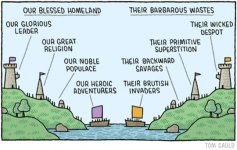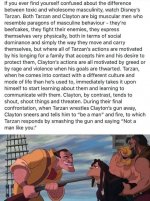Flamestrike
Legend
But we were talking about orcs, meaning mortal creatures with all the depth and complexity of us humans.
Who says a different species has the same depth and complexity as homo sapiens?
Elves have typically been depicted as having more depth and complexity. Vulcans are devoid of emotion. Thri Kreen are giant preying mantises.
We're taking fantasy races here. Don't let anthropomorphic bias get in the way. They're not human.
Homo sapiens tend towards neutrality (although the best and worst can be found among them). Some people are truly altruistic. Some people are monstrously cruel. Most go around doing the best for themselves and their families (N) without either regularly going out of their way to help anyone else (G) and also seeking to avoid harming others (E).
Truly LG people like Jack Ryan, Captain America, Eddard Stark and Sturm Brightblade are rare.
A society with a sufficient number of LG people in it, for it to be regarded as a LG society would be exceedingly rare.
You'd need the majority of people, plus the laws of the land to be charitable, merciful and altruistic (stong welfare for the poor, eradication of homelessness etc) while also avoiding harm (no slavery, capital punishment, corporal punishment).
Without getting political, modern Scandinavia is probably the closest human analogy we have to a LG society. Very low crime (murders and rapes in particular), strong social welfare, free healthcare, near eradication of homelessness, strong record on human rights, abolishment of slavery and capital/ corporal punishment, age of criminal responsibility 15 and all that, coupled with a strong respect for family, honor and tradition.
It doesn't have to be everyone in the society for it to have an overarching general alignment. There are murderers and rapists in Scandinavia, and they're evilly aligned. Drizzt was G aligned and he lived in CE Menzoberazzan as well. Its just most of the people around him (and the social norms and practices he was expected to abide by) were very CE.




